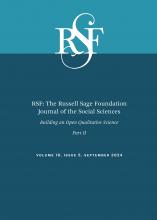Research Article
Open Access
Talk of Family: How Institutional Overlap Shapes Family-Related Discourse Across Social Class
Jessica Halliday Hardie, Alina Arseniev-Koehler, Judith A. Seltzer, Jacob G. Foster
RSF: The Russell Sage Foundation Journal of the Social Sciences September 2024, 10 (5) 165-187; DOI: https://doi.org/10.7758/RSF.2024.10.5.07
Jessica Halliday Hardie
aProfessor of sociology at Hunter College and the Graduate Center, City University of New York, United States
Alina Arseniev-Koehler
bAssistant professor of sociology, Purdue University, and postdoctoral fellow of biomedical informatics, University of California, San Diego, United States
Judith A. Seltzer
cResearch professor of sociology and faculty fellow at the California Center for Population Research, University of California, Los Angeles, United States
Jacob G. Foster
dProfessor of informatics and cognitive science, Indiana University, adjunct professor of sociology and faculty fellow at the California Center for Population Research, University of California, Los Angeles, United States, and external professor at the Santa Fe Institute

REFERENCES
- ↵
- Abramson, Corey M.,
- Zhuofan Li,
- Tara Prendergast, and
- Martín Sánchez-Jankowski
- ↵
- American Voices Project
- ↵
- Arora, Sanjeev,
- Yuanzhi Li,
- Yingyu Liang,
- Tengyu Ma,
- Andrej Risteski
- ↵
- Arora, Sanjeev,
- Yuanzhi Li,
- Yingyu Liang,
- Tengyu Ma, and
- Andrej Risteski
- ↵
- Arora, Sanjeev,
- Yingyu Liang, and
- Tengyu Ma
- ↵
- Arseniev-Koehler, Alina, and
- Jacob G. Foster
- ↵
- Arseniev-Koehler, Alina,
- Susan D. Cochran,
- Vickie M. Mays,
- Kai-Wei Chang, and
- Jacob G. Foster
- ↵
- Besbris, Max,
- Sadie Dempsey,
- Brian McCabe, and
- Eva Rosen
- ↵
- Bianchi, Emily C., and
- Kathleen D. Vohs
- ↵
- Bianchi, Suzanne M.,
- John P. Robinson, and
- Melissa A. Milkie
- ↵
- Bjerre-Nielsen, Andreas, and
- Kristoffer Lind Glavind
- ↵
- Blau, Francine D., and
- Lawrence M. Kahn
- ↵
- Carley, Kathleen
- ↵
- Case, Anne, and
- Angus Deaton
- ↵
- Cheal, David
- ↵
- Cherlin, Andrew J
- ↵
- Cherlin, Andrew J
- ↵
- Choi, HwaJung,
- Robert F. Schoeni,
- Emily E. Wiemers,
- V. Joseph Hotz, and
- Judith A. Seltzer
- ↵
- Collins, Patricia Hill
- ↵
- Comfort, Megan,
- Tasseli McKay,
- Justin Landwehr,
- Erin Kennedy,
- Christine Lindquist, and
- Anupa Bir
- ↵
- Damaske, Sarah
- ↵
- Damaske, Sarah
- ↵
- Danziger, Sandra K
- ↵
- DeVault, Marjorie L
- ↵
- DuBois, James M.,
- Jessica Mozersky,
- Meredith Parsons,
- Heidi A. Welsh,
- Annie Friedrich, and
- Amy Pienta
- ↵
- Edin, Kathryn J.,
- Corey D. Fields,
- David B. Grusky,
- Jure Leskovec,
- Marybeth J. Mattingly,
- Kristen Olson, and
- Charles Varner
- ↵
- Fischer, Claude S
- ↵
- Furstenberg, Frank F., Jr..,
- Lauren E. Harris,
- Luca Maria Pesando, and
- Megan N. Reed
- ↵
- Gerstel, Naomi
- ↵
- Goode, William J
- ↵
- Guzzo, Karen Benjamin, and
- Sarah R. Hayford
- ↵
- Hamilton, Laura T
- ↵
- Hardie, Jessica Halliday
- ↵
- Hirschl, Noah,
- Christine R. Schwartz, and
- Elia Boschetti
- ↵
- Johnson, Elizabeth I., and
- Jane Waldfogel
- ↵
- ↵
- Lareau, Annette
- ↵
- Lawrence, Jon
- ↵
- Mattingly, Marybeth J.,
- Julia Gutierrez,
- Emily R. Perlmeter, and
- Katherine E. Wullert
- ↵
- Paik, Leslie
- ↵
- Park, Sung S.,
- Emily E. Wiemers, and
- Judith A. Seltzer
- ↵
- Parsons, Talcott
- ↵
- Pearce, Lisa D
- ↵
- Robbins, Blaine G.,
- Aimée Dechter, and
- Sabino Kornrich
- ↵
- Rossi, Alice S., and
- Peter Henry Rossi
- ↵
- Sarkisian, Natalia, and
- Naomi Gerstel
- ↵
- Seefeldt, Kristin S., and
- Heather Sandstrom
- ↵
- Seltzer, Judith A
- ↵
- ↵
- Smock, Pamela J., and
- Christine R. Schwartz
- ↵
- Stack, Carol B
- ↵
- Stokes, Jeffrey E., and
- Sarah E. Patterson
- ↵
- ↵
- Tach, Laura, and
- Kathryn Edin
- ↵
- Thomas, Catherine C.,
- Michael C. Schwalbe,
- Macario Garcia,
- Geoffrey L. Cohen, and
- Hazel Rose Markus
- ↵
- Turner, Jonathan H
- ↵
- Turney, Kristin
- ↵
- Turney, Kristin, and
- Christopher Wildeman
- ↵
- Young, Michael W., and
- Peter Willmott
- ↵
- Zilberstein, Shira,
- Elena Ayala-Hurtado,
- Mari Sanchez, and
- Derek Robey
In this issue
Talk of Family: How Institutional Overlap Shapes Family-Related Discourse Across Social Class
Jessica Halliday Hardie, Alina Arseniev-Koehler, Judith A. Seltzer, Jacob G. Foster
RSF: The Russell Sage Foundation Journal of the Social Sciences Sep 2024, 10 (5) 165-187; DOI: 10.7758/RSF.2024.10.5.07
Jump to section
Related Articles
- No related articles found.
Cited By...
- No citing articles found.





